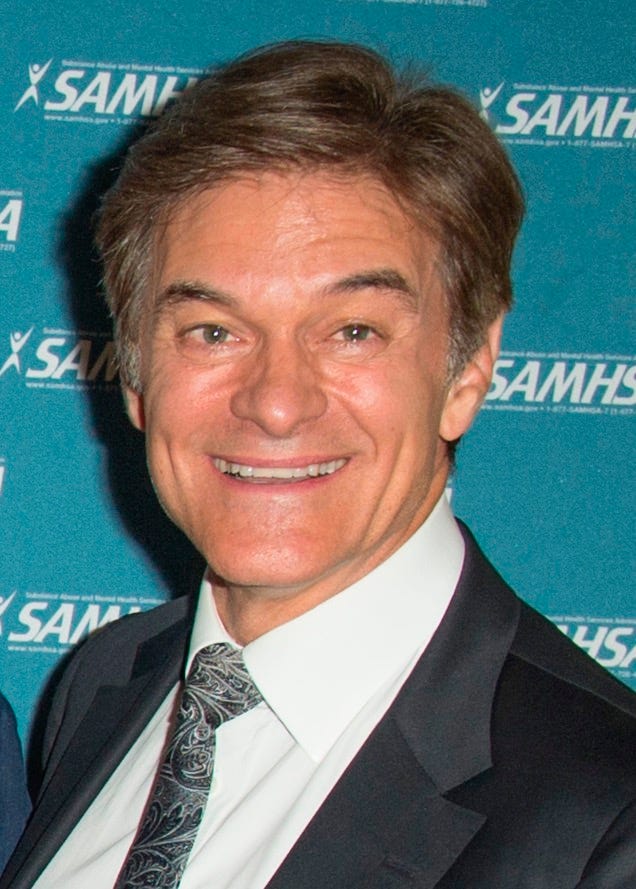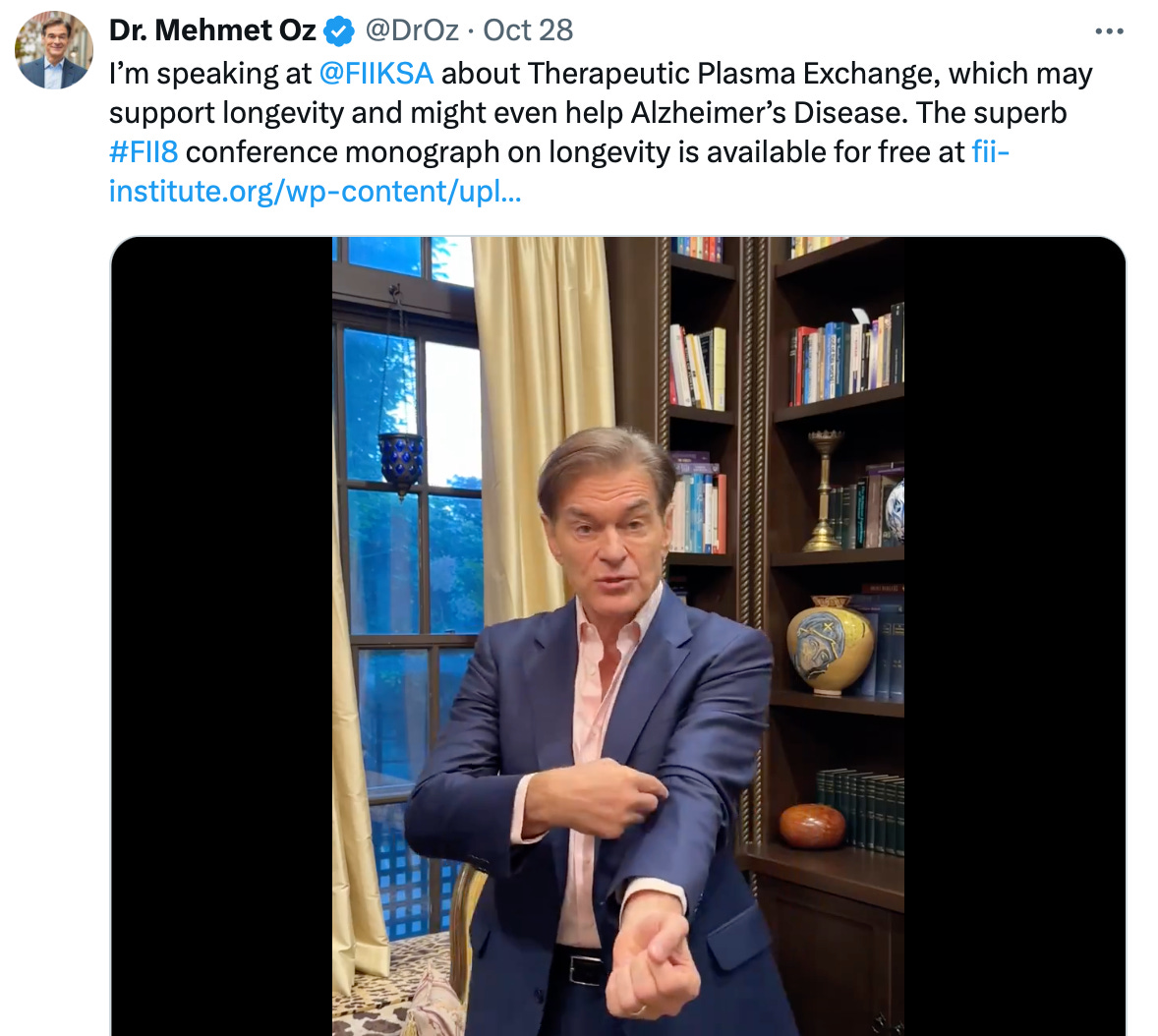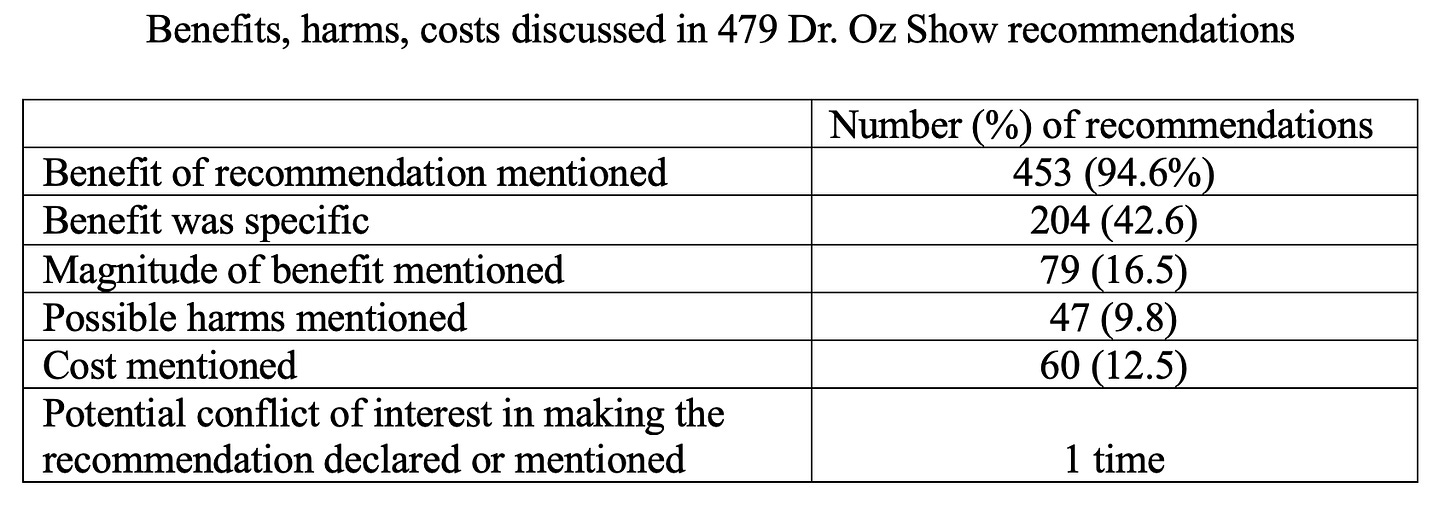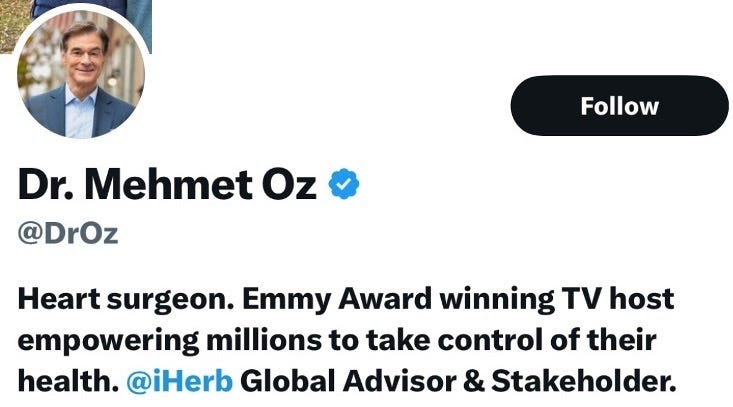Sometimes I will write about health policy on this Substack. My focus will be on values such as evidence, accuracy, equity, and patient-centered approaches. These matter to me - political party affiliation does not.
I’ve followed Dr. Mehmet Oz for about 40 years – from rising star in the cardiothoracic field to talk show host and peddler of remedies. Now he has been announced as the nominee to become director of the Centers for Medicare and Medicaid Services (CMS), “a powerful role,” the New York Times reports, “that would give him control over a more than $1 trillion budget and influence over drug price negotiations, medication coverage decisions, the Affordable Care Act and more.” I thought it might be helpful to offer a reading list about him.
Oz as communicator/educator
Throughout his television career, Oz broached controversial topics in segments that sparked backlash, and he broadcast products and advice that critics said were not backed by evidence.
A feature on gay conversion therapy that asked viewers, “Is there a gay cure?” was slammed by LGBTQ+ groups.
A group of doctors unsuccessfully pushed Columbia University to cut ties with Oz over his statements against genetically modified foods.
In 2003, he was banned from presenting research at the American Association for Thoracic Surgery conference or in its journal for two years over concerns that claims made in a research paper abstract he led were not backed by the data in the study.
He promoted a green coffee bean “miracle pill” to lose weight before the company behind the product was sued by the Federal Trade Commission over bogus claims.
The Times also reminds readers that “Dr. Oz has a long history of promoting dubious weight loss products, including raspberry ketones, garcinia cambogia and green coffee bean extract, frequently extolling their ‘magic’ or ‘miracle’ ability to help people drop pounds. Many of these claims lack evidence or have been proved false.” The Times also reports that before a Senate subcommittee on consumer protection in 2014, Oz admitted that his claims “don’t have the scientific muster to present as fact.”
A 2014 paper in the BMJ (British Medical Journal) analyzed TV medical talk shows. 40 randomly selected episodes of The Dr. Oz Show were analyzed. In all, 479 recommendations were made in those programs – an average of 12 per program. Researchers reported that less than half the recommendations were backed by some evidence. (You can find the details on methodology and on possible limitations in the published paper online.)
The researchers reported:
So while there was a lot of talk about potential benefits, specifics were slim, but rarely discussed were the scope/size of the potential benefits, the possible harms and the costs involved. It’s an uneven playing field when benefits are emphasized, but harms, costs and conflicts of interest are minimized or ignored. That’s a failing grade for any form of health care communication. People just can’t get a true sense of the tradeoffs involved in making a choice to pursue one of those recommendations.
Another smaller analysis of the first 30 episodes of The Dr. Oz Show in 2014 found that:
“Among 77 analyzed recommendations, 30 (38.9%) were supported by evidence,
6 (7.7%) of them were not supported by evidence
and 41 (53.4%) of them had no evidence found.”
Wikipedia offers a long list of medical claims made on The Dr. Oz Show.
Oz & conflicts of interest
The New York Times details his many ties to drug companies and medical device manufacturers. The paper quoted Anthony Wright, executive director of Families USA, a consumer health advocacy organization: “The financial ties need to be investigated fully.”
Oz has promoted hydroxychloroquine as a covid-19 treatment despite admitting, “I really don’t know if it works or not, we still to this day had not been able to prove if it [hydroxychloroquine] works or not.” In 2022, CNBC reported:
Oz… owns stock in Thermo Fisher Scientific, a supplier of the drug hydroxychloroquine, and McKesson, a distributor of the anti-malaria medicine.
Oz backed the use of the drug as a Covid-19 treatment early in the pandemic, and has downplayed warnings about its efficacy as a candidate.
He also pushed the White House to back a study on hydroxychloroquine that he aimed to fund in 2020, according to emails released by a House committee.
Oz’s nonprofit received donations from Sanofi, which previously made the drug.
On the X social media platform, his profile states that he is a global advisor for, and stakeholder in, iHerb, a company that describes itself as “offering Earth’s best-curated selection of health and wellness products at the best possible value.” Presumably, ethics would dictate that he would have to end that relationship as a federal health official.
On our former HealthNewsReview website, we looked carefully at conflicts of interest in media messages, in researchers, in interviewees. We would ask, “Did the message include a discussion of potential conflicts of interest and were there independent sources interviewed?” I recorded this video at the time and I insert it here because it applies to any sort of health care message or messenger - whether a journalist, a talk show host or a government administrator.
Oz & Medicare policy
Oz really likes Medicare Advantage plans - in which subscribers enroll in private health insurers’ plans. The criticisms of these plans are too numerous to detail, but given that Oz would be administrator of Medicare, such criticism is well worth noting. For starters, see what a simple web search turned up on this issue.
Forbes reports: “Oz—who has pushed Medicare Advantage on his show—went beyond that proposal on the Senate campaign trail and in the years prior, calling in a 2020 Forbes op-ed for Medicare Advantage coverage to be extended to all Americans not already enrolled in Medicaid, which would be paid for by a 20% increase to Americans’ payroll taxes (there isn’t any indication the Trump administration is considering this idea, which would mark a significant expansion of the federal government’s role in health insurance).”
This idea has massive cost implications for the federal budget, the federal deficit, for health care providers, for taxpayers and for Medicare-aged citizens trying to make smart decisions.
But more than cost is at stake in the way that CMS will be administered. An article in Barron’s said the decision could put “a man best known for hosting a television talk show into what might be the most important job in the U.S. healthcare system.”








Happy to see you back in the game! Crucially needed at this moment especially.
Glad to see you back in action, Gary. I missed your voice. Take no prisoners. Howard Wolinsky